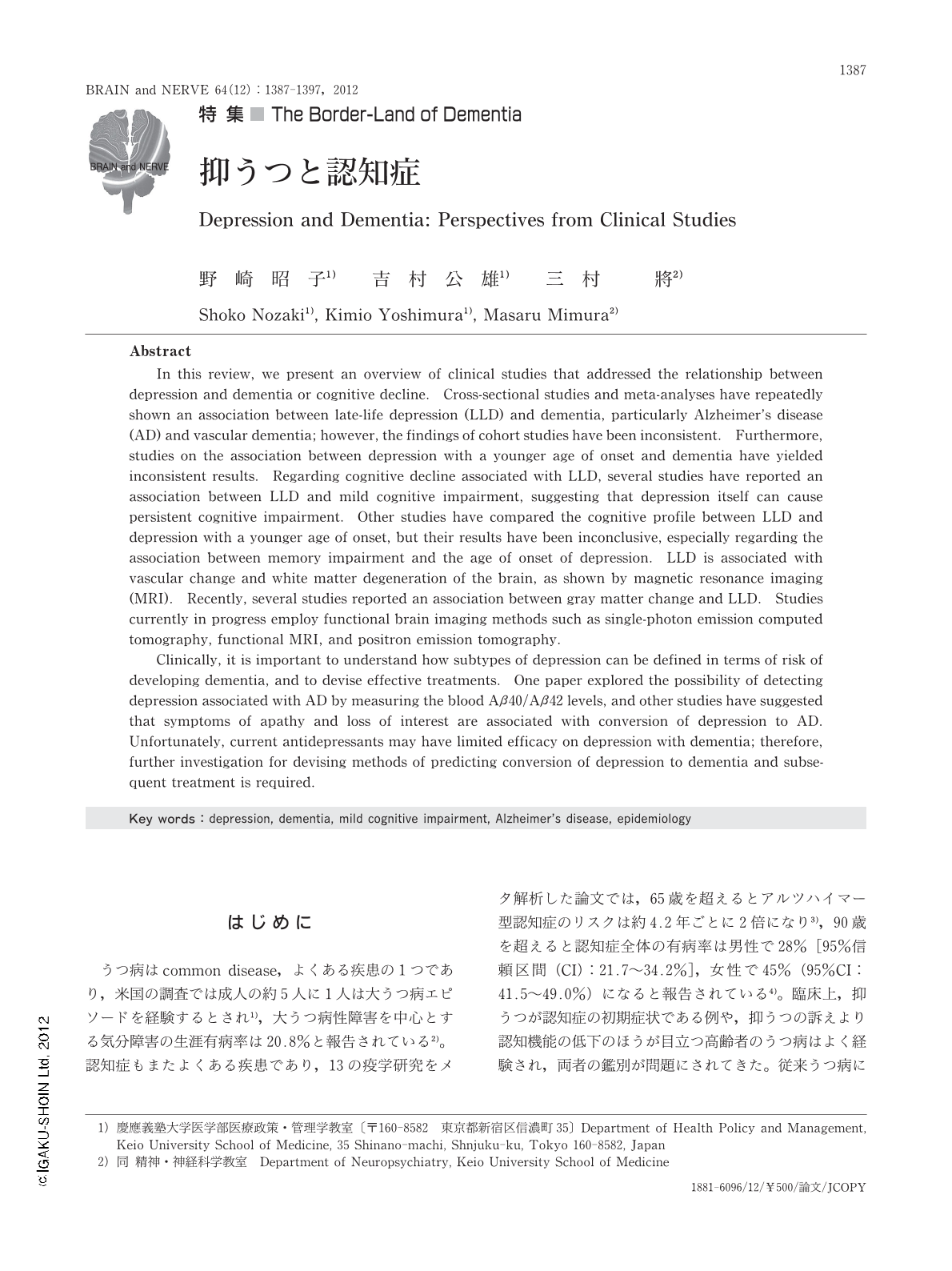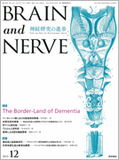Japanese
English
- 有料閲覧
- Abstract 文献概要
- 1ページ目 Look Inside
- 参考文献 Reference
はじめに
うつ病はcommon disease,よくある疾患の1つであり,米国の調査では成人の約5人に1人は大うつ病エピソードを経験するとされ1),大うつ病性障害を中心とする気分障害の生涯有病率は20.8%と報告されている2)。認知症もまたよくある疾患であり,13の疫学研究をメタ解析した論文では,65歳を超えるとアルツハイマー型認知症のリスクは約4.2年ごとに2倍になり3),90歳を超えると認知症全体の有病率は男性で28%[95%信頼区間(CI):21.7~34.2%],女性で45%(95%CI:41.5~49.0%)になると報告されている4)。臨床上,抑うつが認知症の初期症状である例や,抑うつの訴えより認知機能の低下のほうが目立つ高齢者のうつ病はよく経験され,両者の鑑別が問題にされてきた。従来うつ病による認知機能の低下は「仮性認知症(pseudodementia)」として認知症とは区別されてきたが,両者の関連を報告した疫学データの蓄積により,最近ではうつ病と認知症との緊密な関連についての関心が高まっている。本稿では,過去に行われた臨床研究を中心に概説する。
なお,本稿では抑うつ(depression)とうつ病(depressive disorder)とを区別して用い,原則として引用文献の記載に従うが,明確でないときは抑うつと記載することとする。抑うつとうつ病は必ずしも一致せず,抑うつのほうがより広い概念であるが,狭義のうつ病の既往を正確に診断するのは難しく,著者らは抑うつと記載しているものの,おおむねうつ病を意図しているものと思われる。うつ病をはじめとする気分障害には単極性の場合(うつ病)と双極性障害(躁うつ病)の場合があり,うつ病といえば通常は単極性のうつ病を指すが,研究によっては抑うつに気分変調性障害や双極性障害によるうつ病エピソードが含まれている。また,認知症にはアルツハイマー型認知症,血管性認知症をはじめとするいくつかの病型があるが,病型を問わず認知症(dementia)を対象としている場合は認知症と記載し,アルツハイマー型認知症ないしアルツハイマー病を対象としている場合はAD(Alzheimer disease,dementia of Alzheimer type),血管性認知症を対象としている場合にはVD(vascular dementia)と記載する。
Abstract
In this review, we present an overview of clinical studies that addressed the relationship between depression and dementia or cognitive decline. Cross-sectional studies and meta-analyses have repeatedly shown an association between late-life depression (LLD) and dementia, particularly Alzheimer's disease (AD) and vascular dementia; however, the findings of cohort studies have been inconsistent. Furthermore, studies on the association between depression with a younger age of onset and dementia have yielded inconsistent results. Regarding cognitive decline associated with LLD, several studies have reported an association between LLD and mild cognitive impairment, suggesting that depression itself can cause persistent cognitive impairment. Other studies have compared the cognitive profile between LLD and depression with a younger age of onset, but their results have been inconclusive, especially regarding the association between memory impairment and the age of onset of depression. LLD is associated with vascular change and white matter degeneration of the brain, as shown by magnetic resonance imaging (MRI). Recently, several studies reported an association between gray matter change and LLD. Studies currently in progress employ functional brain imaging methods such as single-photon emission computed tomography, functional MRI, and positron emission tomography.
Clinically, it is important to understand how subtypes of depression can be defined in terms of risk of developing dementia, and to devise effective treatments. One paper explored the possibility of detecting depression associated with AD by measuring the blood Aβ40/Aβ42 levels, and other studies have suggested that symptoms of apathy and loss of interest are associated with conversion of depression to AD. Unfortunately, current antidepressants may have limited efficacy on depression with dementia; therefore, further investigation for devising methods of predicting conversion of depression to dementia and subsequent treatment is required.

Copyright © 2012, Igaku-Shoin Ltd. All rights reserved.


